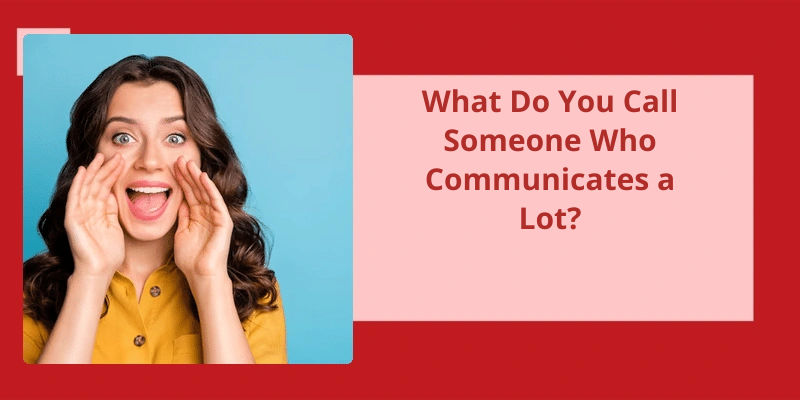One of the most common human traits is our ability to communicate. Language serves as a crucial tool in building relationships, sharing ideas, and understanding one another. However, some individuals seem to excel in communication better than others. These individuals possess an inherent trait of being talkative or verbose. They tend to express their thoughts, ideas, opinions, and experiences with vigor, enthusiasm, and exuberance. They aren’t afraid to engage in conversations, initiate discussions, or express themselves freely. Such individuals have the gift of gab and have a natural ability to connect with others through dialogue. As a result, they’re often referred to as talkative or loquacious. Their ability to communicate freely and openly makes them an essential part of social gatherings, public speaking, and other such forums.
Is a Talkative Person Someone Who Speaks a Lot?
People who’re loquacious tend to be extroverted and enjoy conversation, but their constant talking can also be seen as a negative trait. While some may find their chatter endearing and entertaining, others may feel overwhelmed and annoyed by their constant stream of words.
A talkative person doesn’t necessarily have to be loquacious, as they can engage in conversation without monopolizing it. Someone who’s talkative may simply enjoy socializing and exchanging ideas, which can make for engaging and thoughtful discussions.
However, when a person is overly talkative or loquacious, it can indicate a need for attention or validation. They may feel the need to keep talking in order to feel heard or understood, or to fill silences in a social situation. While this can be a coping mechanism for social anxiety, it can also be seen as self-centered.
It’s important to remember that being talkative or loquacious isn’t inherently good or bad. It depends on the situation and the context in which they’re speaking. In some situations, such as public speaking or sales, being loquacious can be a valuable skill. In others, such as one-on-one conversations, it can be overwhelming and frustrating.
Ultimately, the key is to strike a balance between talking and listening. Engaging in genuine conversation involves both speaking and listening, and those who’re too talkative may miss out on the opportunity to truly connect with others. Being attuned to the needs and interests of others, and taking turns in conversation, can help ensure that everyone is heard and engaged.
While it’s not uncommon to encounter people who only talk but don’t take any action, there’s actually a term used to describe them. It’s an adjective that can be quite fitting when you come across someone who’s excessively talkative but doesn’t prioritize putting in the necessary effort. Read on to find out what this word is and how it’s used.
What Do You Call Someone Who Talks a Lot but Does Nothing?
However, there are other words that can be used to describe someone who talks a lot but does nothing. One such word is “loquacious”, which means talkative or garrulous. Another word is “blabbermouth”, which is a slang term for someone who talks incessantly, not necessarily trivial matters but also things that should be kept confidential.
Sometimes the person who talks a lot but does nothing is referred to as a “windbag”. This word suggests that the persons talk is as empty as the air that fills a bag. It’s an insult that’s often used in a humorous or lighthearted manner.
Some people would refer to such a person as “voluble”, which is a synonym for talkative. However, it doesn’t necessarily imply that the person isn’t doing anything. The word is more about the persons communication style rather than their actions.
Finally, it’s worth mentioning that while there are many words that can be used to describe someone who talks a lot but does nothing, it’s important to be mindful of their feelings. It’s easy to label them as negative things but perhaps try to understand where they’re coming from and see if there’s any way to help them put their words into action.
Describing someone as talkative can carry both positive and negative connotations. While being talkative can certainly make a person appear friendly and sociable, it can also be a bit overwhelming for those who prefer quieter, more introspective conversations. Let’s delve a bit deeper into what it means to be a talkative person.
How Do You Describe a Talkative Person?
Talkative people are known for their ability to keep a conversation going, even if it’s one-sided. They often have a lot of stories to share and are quick to jump into discussions. They enjoy sharing their opinions and ideas, and theyre not afraid to speak their minds. Their enthusiasm and energy can be overwhelming, which can be both a blessing and a curse.
Being talkative can also be a sign of nervousness or anxiety. Some people talk excessively as a way to cope with stress or to fill awkward silences. However, excessive talking can also be a symptom of certain mental health conditions, such as ADHD or bipolar disorder. If you know someone who talks excessively, it’s important to be empathetic and understanding.
Tips for Managing Talkative Behavior in Oneself or Others
- Practice active listening.
- Set expectations and guidelines for communication in group settings.
- Practice self-reflection and monitor your own speaking habits.
- Politely interrupt and redirect the conversation when necessary.
- Encourage quieter individuals to speak up and contribute to the conversation.
- Use nonverbal cues, such as nodding and maintaining eye contact, to signal understanding and respect.
- Take breaks and change the group dynamic if necessary.
- Acknowledge and validate the opinions and contributions of all members of the group.
- Set aside individual time for talkative individuals to share their thoughts and ideas.
Conclusion
In summary, a person who communicates a lot is commonly referred to as talkative. This adjective is used to describe individuals who tend to express themselves frequently and openly. Being talkative could be a personality trait or an acquired habit. It can also be interpreted differently depending on social and cultural norms. However, it’s important to note that being talkative shouldn’t be equated with quality communication. While expressing oneself is crucial, effective communication involves listening and responding appropriately as well. Therefore, whether we identify as talkative or not, honing our communication skills can lead to more meaningful interactions and relationships.






